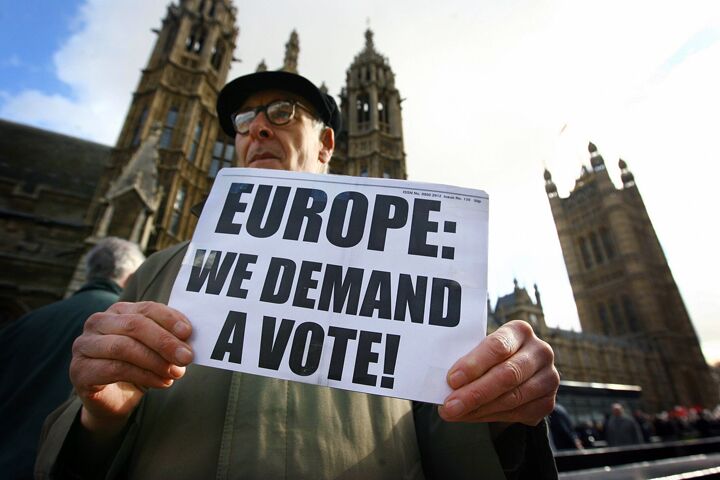
New Campaign Calls for Referendum on Britain’s EU Membership
Over 20,000 people have signed a new initiative calling for a referendum on whether Britain should remain in the European Union. Each person who signs the People’s Pledge promises to only vote for a candidate “who publicly promises to support a binding referendum on our EU membership and to vote for it in the House of Commons.”
On the first day of the campaign, March 15, so many people rushed to sign up that the website crashed.
It is supported by Euroskeptics as well as EU supporters who believe the British public deserves a say on Britain’s role in Europe.
A YouGov poll conducted by the campaign found that out of the 2,436 surveyed, 61 percent want a referendum, while only 25 percent do not.
The campaign is also supported by the Daily Express newspaper, who recently delivered 373,000 signed coupons to the prime minister demanding a referendum.
A recent survey conducted by Angus Reid Public Opinion suggests that such a referendum would pull Britain out of Europe.
Forty-eight percent of Britons would vote to leave the EU, the poll, published last December, found. Only 27 percent would vote to stay in.
Meanwhile, the Economist has identified a new trend in Europe that it believes could eventually lead to Britain’s exit.
An Economist columnist wrote that while he does not believe Britain is about to leave the EU, “there is a non-trivial chance that Britain might fall out of the EU one day.”
“Such a falling-out would involve a hasty withdrawal from a Europe that had taken an impossibly unpalatable turn,” he continued. “The chances of such a messy crisis are rising. Should Britain end up out of the Union, some years hence, historians may look back at two events of the present: a European Union bill currently before Parliament, and Brussels summits planned for March 11.”
The new EU bill states that Britain must hold a referendum on any treaty that would transfer powers to Brussels. Although the government left itself some room to maneuver, the Economist wrote, “the effect is to bolt Britain firmly to the Union’s legal status quo.”
“Yet at the same time, thanks to the existential crisis facing the single currency, Europe’s tectonic plates are in motion,” it continued.
March 11 saw EU leaders hold their first-ever two-tier summit, an event the Economist columnist called “richly symbolic.” In the morning, all 27 leaders met together, but after lunch the 10 leaders whose countries do not use the euro, went home.
This is the fourth eurozone-only meeting. “It is ‘foolish to deny’ that eurozone meetings could turn into a caucus for big decisions, admits a senior Tory. If the worst comes to pass, the 27-strong EU risks being ‘little more than a rubber stamp,’ says an official” (ibid.).
This would put Britain on the outside, even more powerless in the face of EU dictates.
With growing antipathy toward the EU both from the general public and, as the Economist points out, from new Conservative members of Parliament, this gradual shift of power to the euro club could push Britain out of Europe.
Watch for Britain’s enthusiasm for leaving the EU to build. As the Trumpet has written manytimes, it will not be long before Britain will be out.
